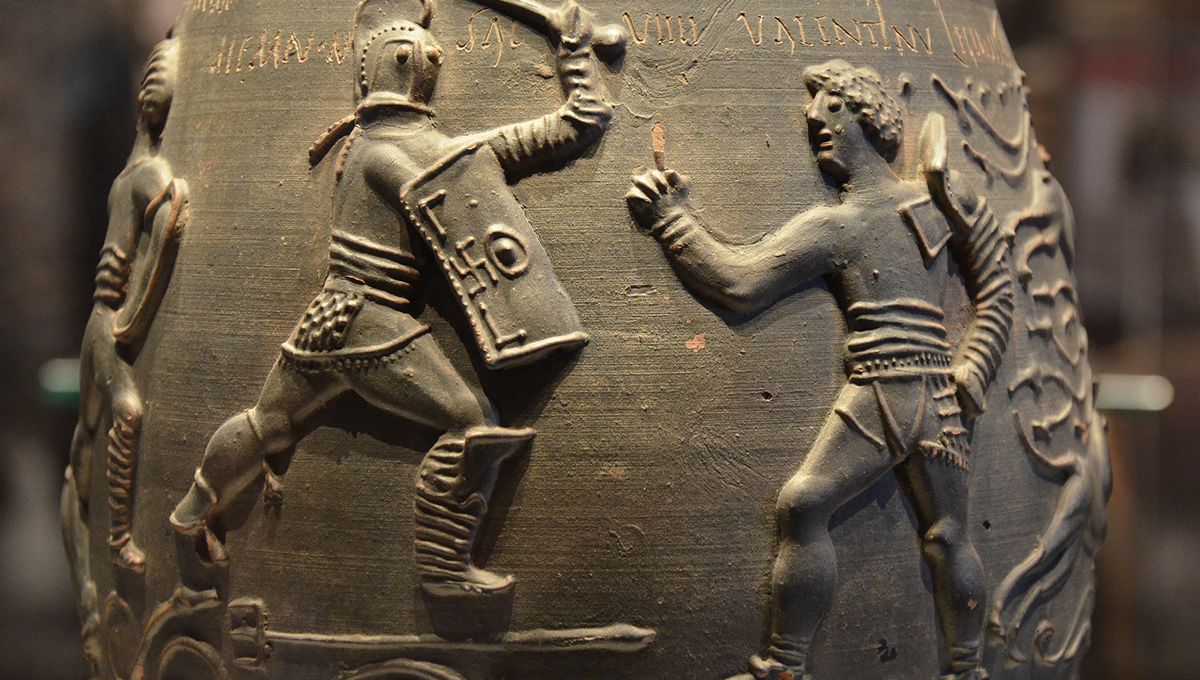
The Roman Empire, according to the first-century poet and satirist Juvenal, owed its survival to two things: bread and circuses.
While that may sound tame, what you have to remember is that “circuses”, back in the days of death by multi-species dogpiling and communal poop sponges, meant something a little more X-rated than Bozo the clown. Instead, entertainment seekers throughout the ancient empire would enthusiastically watch armed gladiators fight each other to the death in sometimes weeks-long marathon bloodbaths.
Gladiatorial combat was incredibly popular, with evidence for the pastime found in virtually every province of the Roman Empire. Until now, though, there was one notable exception: Britannia.
Or so people thought. In fact, the evidence for gladiator fights in Roman Britain had been staring experts in the face for the best part of 200 years – they just needed to take a fresh look.
The Colchester Vase – so called because, well, it’s a vase that was found in Colchester, England – was first discovered in a Roman grave back in 1853. Dating from between 160-200 CE, it’s a beautiful piece of art: about 23 centimeters (9 inches) tall, it’s covered with intricately sculpted scenes of gladiatorial combat.
“There’s nothing else like [it] from Britain,” Glynn Davis, a Roman archaeologist and senior curator at the local Colchester and Ipswich Museums (CIMS), told The Guardian. “It’s a commemorative piece, almost a trophy for the trophy cabinet.”
It’s not just that: the vase doubled up as a funerary urn, containing the cremated remains of – well, someone. “They could well have sponsored the games,” Davis suggested. “Or they were an absolute sports nut. For whatever reason, they saw the fight and thought, ‘I want a memento of that’.”
In fact, so spectacular was the vase that, for a long time, people couldn’t believe it hadn’t come from elsewhere. “The vase is such high quality that there’s been a bit of snobbery, an assumption that it couldn’t possibly have come from Britain,” explained Frank Hargrave, CIMS director.
However, “all the analysis has now put that to bed,” he said. Colchester – or, as it was known to the Romans, Camulodunum – was an important city in Roman Britain, boasting not just three theaters and the only chariot racetrack in Britain, but also a thriving pottery industry. And now, new tests have proven the Colchester Vase to be a rather fine example of that local specialism: it was made from local clay, and inscribed with the names of the featured gladiators before, rather than after, firing.
“It’s the only evidence of a Roman arena gladiator combat actually being staged in Britain,” Hargrave told The Guardian. “There are no written descriptions.”
So, what kinds of sports events could an ancient Roman Briton expect to see at their local arena? In one of the three scenes detailed on the vase, two gladiators labeled “Secundus” and “Mario” fight a bear; in another, the gladiator “Memnon”, a secutor who fought in light armor, was pitted against “Valentinus”, a retiarus armed with a trident and net.
While the figures of Memnon and Valentinus are given personal details – Valentinus is described as being in the 30th legion, which was stationed in northwestern Germany, and Memnon is annotated with the Roman numerals VIIII, meaning he fought and survived nine times, per Live Science – those probably weren’t the fighters’ real names, John Pearce, senior lecturer in archaeology at King’s College London, told The Guardian.
“Memnon appears quite often in Roman literature,” he explained. “He’s described as this massively impressive ‘black-skinned’ person, this hero who comes from Troy.”
“I’m wondering why Memnon would be chosen as the name of the gladiator,” he added. “Is that because we’ve got a Black gladiator who is from somewhere well south of Colchester – from north Africa?”
Whoever he was, Memnon appears to have been victorious in this instance: the vase shows the moment at which Valentinus raises his finger in the sign of submission to his opponent.
“The ad digitum gesture by Valentinus signals the end of combat, but the decision to spare or slaughter him, and thus his fate as victim or survivor … is unreported,” Davis and Pearce write in their forthcoming paper on the new research findings, The Guardian reports.
“You’re looking at this moment in time,” Davis told The Guardian. “Is Valentinus spared? That would be down to the owner of the gladiators and sponsor of the games, as they are slaves.”
Source Link: Roman Gladiators Fought In Britain, And We Finally Have The Evidence To Prove It